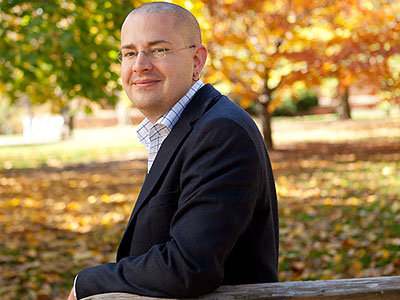
For Russell Ford, comedy is not just a laughing matter.
Ford, an associate professor of philosophy at Elmhurst, is one of a growing number of scholars mining comedy and other performance categories as sources of philosophical insight. Their interest in the serious side of funny business was on display at a recent conference in Berlin called Thinking Through Tragedy and Comedy.
Ford, part of an international panel of scholars at the conference, argued that theatrical comedy, though often overlooked as inconsequential compared to tragedy, offers its own moral lessons.
“The Western tradition since Plato and Aristotle has thought that tragedy offered something important to say about the human condition,” Ford said. “But comedy is in its own way relevant for ethical living.”
Ford said that comedy’s interest in human fallibility and foolishness serves as useful counterpoint to tragedy, with its celebrations of heroic suffering.
“Comedy leads us to a more cautious estimation of our capabilities,” he said.
The ideas presented at the December conference at Berlin’s Institute for Cultural Inquiry are part of a growing academic field sometimes called Performance Philosophy. The nascent discipline applies philosophy to dance, theatre, music and other kinds of performance. The mix of subjects—Karl Marx meets Groucho—has proven fertile for scholars. Chicago will host the second biennial Performance Philosophy conference in April. Ford himself is readying for publication a collection of essays from a 2012 conference he helped organize called Why So Serious: Philosophy and Comedy.
Ford became interested in the philosophical implications of comedy when as a graduate student at Penn State, he saw Life is Beautiful, a 1997 movie starring the comic Roberto Benigni, set partly in a Nazi concentration camp. Ford was struck by the way the film blended comedy with a serious consideration of evil and morality.
“I began thinking about why we don’t tend to think of comedies as morally instructive,” Ford said.
His scholarship has taken him deep into the history of the Western comic tradition. At a 2005 conference in Italy, he organized a production of Clouds, the seminal satire by the ancient Greek playwright Aristophanes. Ford staged the play in a hotel lobby, his cast made up entirely of academics. (Ford’s dissertation supervisor got the plum part of Socrates.) The production remains a minor legend on the philosophy conference circuit.
If comedy has been overlooked as a source of ethical wisdom, it may be because the genre has lacked the champions that tragedy has enjoyed. Aristotle’s Poetics, the oldest known work of dramatic theory, is mainly concerned with tragedy. A “lost” second book by Aristotle, thought by scholars to focus on comedy, has never surfaced. Aristotle himself suggested that comedy historically had been “not at first taken seriously” and therefore was unduly neglected.
Two thousand years later, scholars like Ford and the others who gathered in Berlin are finally seeking to give comedy its due. He pointed to the conference as evidence that comedy is worthy of serious consideration.
“It was nice to see how many people wanted to talk about these ideas,” Ford said.